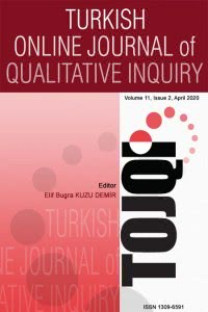Analysis of Middle School Students’ Views on Scientific Inquiry in the Context of Science Achievement
Ortaokul Öğrencilerinin Bilimsel Araştırmaya Yönelik Görüşlerinin Fen Başarısı Bağlamında İncelenmesi
___
Adisendjaja, Y.H., Rustaman, N.Y., Redjeki, S., & Satori, D. (2017). Science teachers’ understanding of scientific inquiry in teacher professional development. Journal of Physics: Conference Series, 812, 1-5.Aldahmash, A.H., Mansour, N.S., Alshamrani, S.M., & Almohi, S. (2016). An analysis of activities in Saudi Arabian middle school science textbooks and workbooks for the inclusion of essential features of inquiry. Research in Science Education, 46, 879-900.
Anggraeni, N., Adisendjaj, Y.H., & Amprasto, A. (2017). Profile of high school students’ understanding of scientific inquiry. Journal of Physics: Conference Series, 895, 1-5.
Barrow, L.H. (2006). A brief history of inquiry: From Dewey to standards. Journal of Science Teacher Education, 17, 265-278.
Bybee, R.W. (2002). Learning science and the science of learning: science educators' essay collection. National Science Teachers Association.
Cevizci, A. (2011). Eğitim felsefesi. İstanbul: Say.
Creswell, J.W. (2013). Qualitative inquiry & research design choosing among five approaches. Sage Publications.
Davey, L. (1991). The application of case study evaluations. Practical Assessment, Research & Evaluation, 2(9). 1-2.
de Jong, T. (2006). Computer simulations-technological advances in inquiry learning. Science, 312, 532-533.
Dojman, H. N. (2003). An analysis of elementary teachers’ perceptions of teaching science as inquiry. Doctoral Dissertation, The Faculty of the College of Education University of Houston, Texas.
Galano, S., Alessandro, Z., Luigi, S., & Italo, T. (2016). Secondary students’ views about scientific inquiry. Retrieved January, 25, 2018 from http://www1.unipa.it/girep2014/accepted-papers proceedings/62_Galano.pdf
Jarrett, D. (1997). Inquiry strategies for science and mathematics learning it’s just good teaching. Oregon: Northwest Regional Educational Laboratory.
Johnston, J.S. (2009). Deweyan inquiry: From education theory to practice. Albany: State University of New York Press.
Karışan, D., Bilican, K., & Şenler, B. (2017). Bilimsel sorgulama hakkında görüş anketi: Türkçeye uyarlama, geçerlik ve güvenirlik çalışması. İnönü Üniversitesi Eğitim Fakültesi Dergisi, 18(1), 326-343.
Leblebicioğlu, G., Çapkınoğlu, E., Metin, D., & Schwartz, R. (2017). Views of nature of scientific inquiry of the students in a science high school in Turkey: a vasi application. Paper presented at ESERA, 2017.
Lederman, J.S., Lederman, N.G., Bartos, S.A., Bartels, S.L., Meyer, A.A., & Schwartz, R. S. (2014). Meaningful assessment of learners’ understandings about scientific inquiry the views about scientific inquiry (VASI) questionnaire. Journal of Research in Science Teaching, 51(1), 65-83.
Lee, H.S., & Songer, N.B. (2003). Making authentic science accessible to students. International Journal of Science Education, 25(1), 1-26.
Lustick, D. (2009). The failure of inquiry: preparing science teachers with an authentic investigation. Journal of Science Teacher Education, 20, 583-604.
Martin-Hansen, L. (2002). Defining inquiry. The Science Teacher, 69(2), 34-37.
MEB-TTKB. (2006). İlköğretim kurumları (ilkokullar ve ortaokullar) fen bilimleri dersi (3, 4, 5, 6, 7 ve 8. sınıflar) öğretim programı. Ankara: MEB.
MEB-TTKB. (2013). İlköğretim kurumları (ilkokullar ve ortaokullar) fen bilimleri dersi (3, 4, 5, 6, 7 ve 8. sınıflar)öğretim programı. Ankara: MEB.
MEB-TTKB. (2018). İlköğretim kurumları (ilkokullar ve ortaokullar) fen bilimleri dersi (3, 4, 5, 6, 7 ve 8. sınıflar) öğretim programı. Ankara: MEB.
Miles, M.B., & Huberman, A.M. (1994). Qualitative data analysis. Thousand Oaks, CA: Sage.
MoNE. (2015). International student assesment programme PISA national pre report. MoNe Ölçme, Değerlendirme ve Sınav Hizmetleri Genel Müdürlüğü, Ankara.
Patton. M. Q. (2002). Qualitative research and evaluation methods (3rd ed.). Thousand Oaks, CA: Sage Publications.
Sadeh, I., & Zion, M. (2012). Which type of inquiry project do high school biology students prefer: Open or guided? Research Science Education, 42, 831-848.
Schwartz, R.S., Lederman, N.G., & Barbara A.C. (2004). Developing views of nature of science in an authentic context: An explicit approach to bridging the gap between nature of science and scientific inquiry. Science Teacher Education, 88(4), 610-645.
Schwartz, R.S., Lederman, N.G., & Lederman, J.S. (2008). An instrument to assess views of scientific inquiry: The VOSI questionnaire. International Conference of the National Association for Research in Science Teaching (NARST), Baltimore, MD.
Şenler, B. (2015). Middle school students’ views of scientific inquiry: an international comparative study. Science Education International, 26(2), 166-179.
Yang, I.H., Park, S.W., Shin, J.Y., & Lim, S.M. (2017). Exploring Korean middle school students’ view about scientific inquiry. Eurasia Journal of Mathematics Science and Technology Education, 13(7), 3935-3958.
- ISSN: 1309-6591
- Yayın Aralığı: 4
- Başlangıç: 2010
- Yayıncı: Prof.Dr. Abdullah Kuzu
Sınıf Yönetimi Derslerinde Eğitim Konulu Filmlerin Kullanılması: Metaforik Bir Çalışma
Orkide Bakalım, Faika Şanal Karahan, Gözde Şensoy
Zehra Saadet Fırat, Çağlayan Dinçer
Use of Educational Movies in Classroom Management Courses: A Metaphorical Study
ORKİDE BAKALIM, Faika ŞANAL KARAHAN, Gözde ŞENSOY
Gönüllülük: Topluma Hizmet Uygulamaları Dersinin Değerlendirilmesi
Zehra Saadet FIRAT, Çağlayan DİNÇER
Volunteering: Evaluation of Community Service Learning Program
